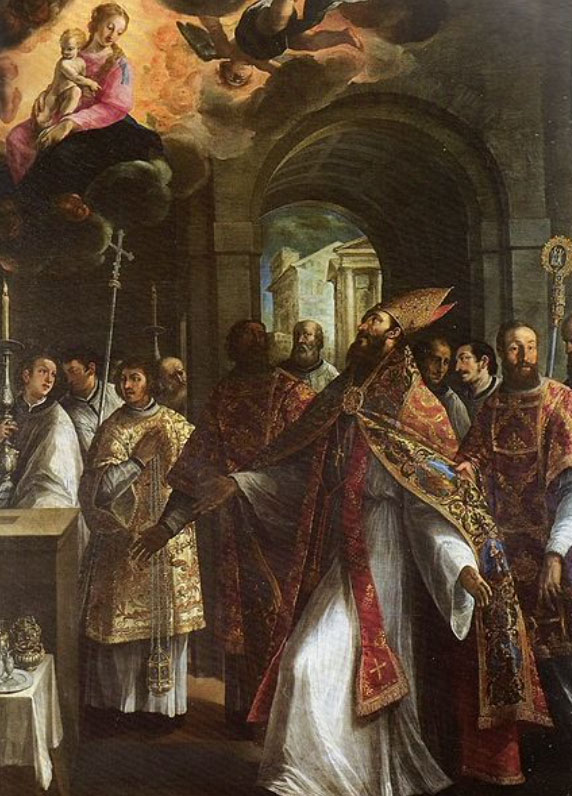Feast Day: April 21st
These past weeks, as we have continued to celebrate Easter, we have also begun to examine the sacrament of Holy Orders. As it turned out, we started with the young man who fled Jesus’ agony in the garden in shame, but astonishingly reappears at the tomb, now splendid, and bearing a message of hope. Priests are not much different: somewhere deep in the heart of the priesthood is that spectacular truth that God calls men, sinners still so much in need of His mercy, yet then He literally clothes them in white for the celebration of the Mass, a sign of the Lord’s grace at work in the priest’s hands, and words, and love.
Last week we found ourselves watching the drama unfold around Pope Martin I, as he struggled to stay faithful to His Lord and Savior as errors, emperors, assassins, and intrigue pummeled him from all sides. In his life we have another facet of priesthood: not the sinner-supernaturalized but the shepherd-suffering, scorned, and surrounded. How did that grace of ordination cascade through his life? I see it in Martin’s divine doggedness in the face of horrific attacks upon him, his papacy, and his Divine Master.
First Poverty. Then Perseverance. This week: Prayer. (Next week: Preaching)
And for this third pillar of what it means to be a priest, to be someone immersed in prayer, a pray-er, a mediator, an intercessor – someone who stands before God and communicates to Him the weaknesses and worship of His people, and communicates to the people the Word and wealth of God – we turn to St. Anselm of Canterbury. Of course, I choose him because his feast day will occur on April 21st, the day he died in 1109 in Canterbury England. He was a philosopher, an abbot, and a bishop, and found himself immersed in the chaos and challenges of his day in all those roles (all of which, at first, he was forced into, and yet from all of them he learned the characteristics of prudence, patience, and prayerfulness that would make up his sanctity)… but we catch a glimpse of him as a priest … simply a priest … in his most famous writing, the Proslogium. Most people read it because there he is the first one to describe an ontological argument for God’s existence, but the work is truly at its heart a prayer. Here is how Anselm begins:
Come on now little man, get away from your worldly occupations for a while, escape from your tumultuous thoughts. Lay aside your burdensome cares and put off your laborious exertions. Give yourself over to God for a little while, and rest for a while in Him. Enter into the cell of your mind, shut out everything except God and whatever helps you to seek Him once the door is shut. Speak now, my heart, and say to God, “I seek your face; your face, Lord, I seek.” – St. Anselm of Canterbury, Proslogion, Chapter 1.
Might I invite you into that place of silence and prayer as well? Can you and I say those same words: “I seek Your face.” Anselm tends through philosophy, theology, scripture, and much more in the course of his great philosophical work, but at the end, he reminds us that it is really a great prayerful work:

God, I pray, let me know and love You, so that I may rejoice in You. And if I cannot in this life [know, love, and rejoice in You] fully, at least let me advance day by day until the point of fullness comes. Let knowledge of You progress in me here and be made full [in me] there. Let love for You grow [in me here] and be [made] full [in me] there, so that here my joy may be great with expectancy and there may be full in realization. O Lord, You command—or, rather, You counsel—[us] to ask through Your Son; and You promise [that we shall] receive, so that our joy may be full. O Lord, I ask for what You counsel through our marvelous Counselor; may I receive what You promise through Your Truth, so that my joy may be full. O God of Truth, I ask; may I receive, so that my joy may be full. Until then, may my mind meditate upon [what You have promised]; may my tongue speak of it. May my heart love it; may my mouth proclaim it. May my soul hunger for it; may my flesh thirst for [it]; may my whole substance desire [it] until such time as I enter into the joy. St. Anselm of Canterbury, Proslogion, Chapter 26.
Anselm’s writing, and life, and ministry, began and ended in prayer, can ours do so as well? Can our thirst for joy, peace, love, and meaning finds its answer in the Lord?
Fr. Dominic Rankin begins every day with an hour of prayer. It is not usually filled with mystical moments or felt phenomenon, more than anything it is a conversation that often begins and ends with “I seek you face”, and that challenging yet thrilling continued yearning for God’s love, for myself and all those entrusted to my care. This is Christ’s priesthood too.